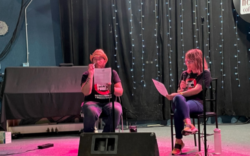At the East Athens Community Center back in February, before the pandemic curtailed live performances, several artists performed on leap day for a Black History Month celebration. One was 26-year-old Karica Smith—also known by her stage name, Seline Haze—who was voted Best Female Hip-Hop Artist at the 2018 Athens Hip-Hop Awards. Gymnasium bleachers were packed with people attentive to a fitting prologue to her first-ever release “Waves,” a wash of empowerment discussing mental health and the Black identity. In her introduction, Smith filled the wide, open floor with thoughts on the mental health stigma that’s present in the Black community. “People are dealing with mental illnesses, and Black people don’t like to talk about it. Let’s be real. We like to brush it off,” Smith said. In many of her songs, the self-proclaimed survivor talks about her struggles and her life burdens—going through them to get over them—and provokes the listener to do the same. Smith is a hip-hop artist with a passion to talk about mental health.
As I crouched and listened to Smith over the sounds of children playing, Montu Miller, Smith’s manager and an employee at the community center, chimed in on the conversation. “She takes care of folks—in music, in her life. That’s just what she does,” Miller said with ease. Miller has known Smith for a few years, but it wasn’t until this past year that he became her manager. He was always intrigued by her movement and by what she had to say.
“She’s one of those artists—when she’s telling her story, you can feel it. When she’s on the mic, and she’s talking, there’s this vibe, this energy. You can feel her being triumphant. You can feel that she’s been through the fire and got through it,” Miller said. “She’s a healer.”
One of the best feelings Smith has experienced is fans telling her that she’s helped them through a difficult time. “I was searching for my purpose in life, and I think I finally found it,” she said. Whether through her music, motherhood, caring for her father or her occupation as a certified nursing assistant at a retirement/rehabilitation facility, her purpose is helping people, according to Smith. She was conditioned to be a nurturer at an early age, having always had to care for her cousins at holiday gatherings and other family events, she explained.
Smith grew up in Athens with inspirational figures who pushed her to do what she loved, despite the traditions typically enforced on her, like preening for a doctor’s or lawyer’s career. In her song “Focused,” Smith raps about her grandfather through feelings of grief, “Grandpa can’t get no hug / or the love / he used to speak through our conversations / help us breathe, too / elevating on a different station / dodging our different situations / that cause complications.” Smith’s grandfather empowered her as an individual. “He always told me to do what I love. He always tried to push that,” she said. “He was always somebody that spoke up and was just like, ‘You can be your own self.’”

Grief is a recurring emotion that Smith addresses in her music. Not only did she face the loss of her grandfather, but her first-born died a month and two days after giving birth. Other emergent topics in Smith’s music come from the obstacles in everyday life experiences, like single parenthood, being a Black woman and, more broadly, mental illness. Smith often characterizes her depressive states as “demons” in her songs, an effect of those daily trials and traumatic events.
Common devices in her songs are earth-centric metaphors, such as the opening verses of “Evolve,” her personal favorite and a tribute to Saba’s song, “Life.” She starts by advising the listener, “tend to your garden” and describes why she’s had to tend to her own, “reaching for that gleaming silver lining / life is full of these surprises / mindless mind / I look, so where I find it? / I can’t stop the ticking clock / it’s timing / depressing hit the peak from all the climbing.”
By “tend to your garden,” Smith means to focus on yourself, love yourself and cultivate who you want to become. “[The garden] represents your life, your friends, the important things, the things that matter and the seeds that you plant in order for things to grow, things to get better. It’s whatever you manifest in this life,” she said.
On her bandcamp page, Smith introduces “Evolve” by writing, “Life isn’t easy for everyone. Some are fighting a war no one knows about, despite our worldly news. I found myself in a hard battle with depression, struggling for my life.” She asks, “How much can you lose before you self-destruct? Or will you use it to EVOLVE?” The depression that Haze describes is coupled with anxiety. She says she has struggled with anxiety most of her life. She’s always been shy—Karica has anyway. Many artists use an alias— for different reasons—but Smith said Seline Haze allows her to be the person she always wanted to be. “Seline Haze just has this fierceness to her, demands respect,” she said. Smith jumps into this mindset before every performance.
Writing music and mixing her own tracks is a therapeutic process for Smith, but she hopes that her music can help listeners get through whatever they are experiencing, whether it’s getting over trauma or even the small stuff. “I’m hoping that I can help someone, some kind of way, the same way music helped me,” she said. “I make music overall to cope through stuff I’m experiencing, like depression. I just hope somebody feels me.”
Smith’s stories of struggle are especially important to share with other women in the community. Women are more frequently diagnosed with depression, as compared to their counterparts, according to Lisa Anger, an Athens-based therapist in practice for almost 30 years. Women tend to internalize their emotions, Anger explains. By sharing these stories, Haze and other women artists allow for the listener to relate to those emotions.
Female hip-hop artistry is an important presence in the Athens hip-hop community, where there are few participants. Athens-Clarke County Commissioner, fellow hip-hop artist and godmother to Smith’s children is Mariah Parker, also known as Linqua Franqa. Like Smith’s, Parker’s music hones on mental health, race and gender issues. Being a woman in the hip-hop community is a “mixed bag,” according to Parker. It poses issues like sexism, tokenization and skepticism, but those issues bring a dimension of relatability, according to Parker. “I think people see us as unique. We benefit from standing out amongst the crowd for representing an underrepresented perspective as women, and I think people value that, too.” After observing Parker’s involvement in hip-hop around Athens, Smith reached out to her, and their relationship grew from there. “I think that her candidness in her stories of struggle, and finding resilience and strength, and overcoming those struggles is really powerful,” Parker says.
Parker was one of the 11 artists at the release show for Classic City Wax: Vol. 1, a record that compiled prominent Athens hip-hop artists. Each artist performed a 15-minute set. Preceding Parker was Brittany Sanders, better known as LB, who owned the Caledonia Lounge’s stage with her energy, composed of both her music and choreography. Since the age of 3, Sanders has been dancing—dancing and a love for Missy Elliott is what introduced Sanders to performance. Sanders always had the passion for music, but she continues to confront the need to perform songs that express her vulnerability. Sanders is another female hip-hop artist in Athens whose music highlights mental health.
After her set, Sanders came forward about personal strife and confessed that she was close to giving up before being asked to perform at the show. “I had been mentally struggling, and I just wanted to quit everything,” Sanders said. “Every time it rains, it pours for me.” Sanders has faced her own heavy set of obstacles—all faced without having much belief or support from her network. Like Smith, she copes through music and hopes to make a positive impact by making people know that they’re not alone.
Sanders also participated in the Black History Month event, and after their performance, she and Smith planned to collaborate. “We’re looking forward to trying to figure out a time and place and all that kind of stuff to figure out a way for us to do a track together, to really put all that emotion into a track.”
With Miller’s help, Smith continues to make new music, having just released a six-track EP titled Haze on June 5, and she continues to perform for her “rose squad” of family, friends, supporters and anyone undergoing life trials by fire. As it was nearing dinner time, Smith’s daughter returned from play and murmured, “I’m hungry.” The conversation understandably had to end. In parting, the mama and musician said, “Tend to your garden. Love yourself”—characteristically so.
Like what you just read? Support Flagpole by making a donation today. Every dollar you give helps fund our ongoing mission to provide Athens with quality, independent journalism.









